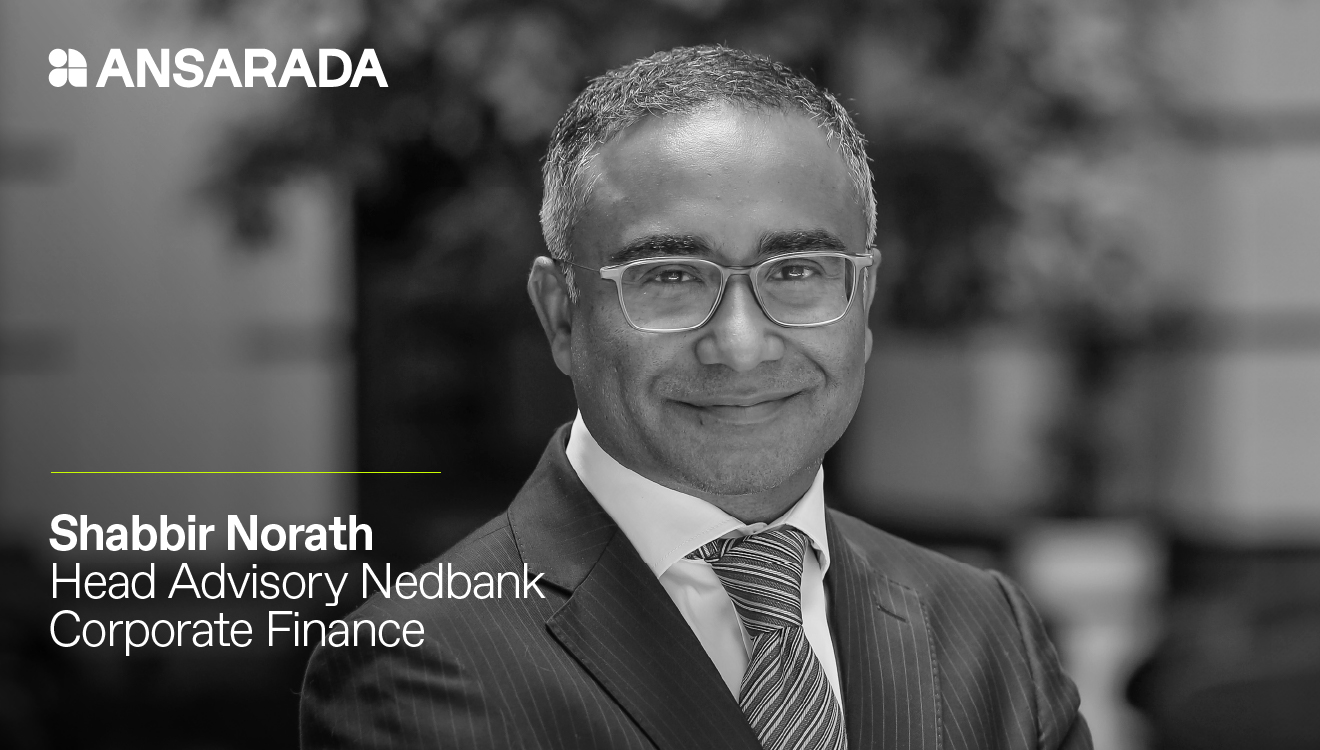Mastering M&A in South and Sub-Saharan Africa: Strategies for Success
Shabbir Norath - Nedbank Corporate Finance | 2024/2025 Africa M&A Outlook
By ansaradaMon Jul 29 2024

The insights from these seasoned dealmakers underscore the importance of adaptability, innovation, and thorough preparation in navigating the complexities of dealmaking in South and Sub-Saharan Africa. By leveraging creative deal structures, conducting rigorous due diligence, understanding macroeconomic and regulatory dynamics, and focusing on resilient sectors, dealmakers can successfully navigate challenges and seize opportunities in this dynamic market.
Tell us a bit about your career in M&A and some of the notable transactions you’ve been involved in.
It’s been an interesting career, spanning 23 years in investment banking. I’ve seen the market through various phases, from the difficult days in 2001 to the glory days before the 2008 crash, and then through COVID-19 to where we stand now. The JSE has had a tough time, particularly
with the number of delistings. However, we see significant interest from foreign acquirers, attracted by well-run businesses with exceptional management, available at relatively low costs compared to international peers. For example, we’ve seen deals like DP World’s acquisition of Imperial and the ongoing Anglo BHP deal. Notable transactions, include the listing and capital raising for Armgold, the BEE transactions for Nedbank and Mutual & Federal, as part of the Old Mutual Group BEE transaction, the MTN Zakhele Futhi BEE transaction and recently, the acquisition of Eqstra from ENX Group.
Given the current macroeconomic factors, do you expect interest rates to decrease by the end of the year, or is this conversation shifting to 2025?
That’s a tough one. I suspect interest rates will remain flat for some time. Whether we see a decrease by the end of this year will depend heavily on inflation and inflation targeting. My personal view is that we’ve probably extended this current interest rate cycle too far. However, the Reserve Bank’s targeting of inflation will be a key driver in their decision-making process.
When do you foresee a solid turnaround in M&A activity? Could it be later this year or not until 2025?
It’s hard to predict. Election years, like this one, add to the uncertainty. There are more than 60 elections worldwide this year, with over 2 billion voters heading for the polls, creating uncertainty and nervousness amongst corporates. In South Africa, if the ANC does not secure a majority, the question of who will be responsible for key decisions post-elections becomes crucial. Most M&A deals take time to finalize, involving numerous regulatory hurdles. I suspect a lot of the decision- making will occur after the elections.
Are there particular regions or sectors in Sub-Saharan Africa that might stand out for increased M&A activity through the end of the year?
We see quite a bit of activity in East Africa, with countries like Kenya, Tanzania, Uganda, Rwanda, and to some extent Zambia and Mozambique, showing significant growth. The Middle East also shows increased interest in diversifying their exposure to Africa. The challenge, however, remains in currency risks and how to repatriate profits. Export-oriented or dollar-based businesses tend to negate some of these risks, offering more stability in valuations.
How are dealmakers getting creative with deal structures to manage currency risk and close valuation gaps?
Mitigating currency risk is indeed challenging. Government-to-government relations play a crucial role, and local currency funding can help mitigate some of the risks. Businesses with dollar or euro-based incomes can also offer some protection against currency devaluations. Joint ventures and club deals are becoming more common to spread and manage these risks effectively.
What do you see as the key drivers of M&A activity for the rest of the year?
Private equity is a significant driver, especially as funds reach their end and need to exit investments. There’s also substantial interest from foreign buyers looking at African assets as relatively cheap investments in markets with good GDP growth. Despite a lot of dry powder in the market, high interest rates and low GDP growth make deal-making cautious, focusing more on mid-market and bolt-on transactions rather than large headline deals.
How do you view the rise of private debt as a theme for the rest of the year and beyond?
Private debt is indeed rising, offering attractive returns compared to equity markets. This shift is understandable given the returns on private credit, which can be a more attractive option for private equity funds, allowing them to keep their powder dry for the perfect acquisition.
What major risks or challenges could dealmakers face for the remainder of this year?
The low-growth environment and high interest rates are significant challenges. However, the biggest risk is political uncertainty. The outcome of elections and the resulting government policies will be crucial. There’s also an increased focus on public interest in M&A assessments by competition authorities, which adds another layer of complexity to deals.
How is the due diligence process evolving with the current challenges and opportunities?
The days of sifting through physical files are over. Everything is electronic now, with data rooms and AI-driven reviews streamlining the process. This allows for more comprehensive and efficient due diligence. Regulatory risks are being addressed earlier in the process, and commercial due diligence is becoming more prevalent, focusing on the acquisition’s strategic value to the buyer.
What excites you about deal-making opportunities in the current market?
Despite the turmoil, there are always opportunities. South Africa, in particular, offers solid investment opportunities with well-managed companies. The rand, despite its devaluation, hasn’t experienced the severe drops seen in other currencies. For foreign investors, this market still offers attractive returns.